- Home
- Paul Finch
Medi-Evil 2 Page 4
Medi-Evil 2 Read online
Page 4
Tell her to reap it with a sickle of leather ...
Parsley, sage, rosemary and thyme.
And gather it all in a bunch of heather.
Then she’ll be a true love of mine.
Are to you going to Scarborough Fair ...
The door was still open, so Eric made to leave.
“You steal in without announcing yourself, and then steal out again,” Ella said in her Anglo-accented French. “How like a Norman that is.”
Agnes ceased her strumming.
“I ... I didn’t wish to disturb you,” Eric said.
“You didn’t?” Ella replied, still not looking round. “How unlike a Norman. Agnes … if it would make you more comfortable, you may leave us.”
Relieved, the maid stood, curtsied and left the room, closing the door quietly behind her. Eric hovered awkwardly. Ella continued to work.
“So you’re home at last,” she finally said.
“I hoped you’d still be here.”
She turned to face him. Ella’s had always been a strange, indefinable beauty. She had delicate brows, a pert nose, pink lips – in so many ways she was traditionally pretty. But there was something else – she had curious violet eyes, and a mysterious, ethereal aspect. Isabel had used to call her ‘the faerie child’.
“Where else would I be?” she asked.
“I …” Eric stumbled over his words; as always he was lost in those eyes. “No-one’s pleased to see me, Ella.”
“Does that surprise you?” If she herself was surprised – by his bedraggled state, she didn’t show it. She regarded him coolly, distantly, as if he were someone she didn’t know very well but still disapproved of.
“Please don’t tell me you feel the same way,” he said.
She returned to her needle-work. “I have no feelings left, Eric. I simply report what I see. I suspect they are displeased because they feel you have done nothing useful with your life.”
That pricked him. “And what if I haven’t? Can father not love me simply as his son?”
“Your father has four sons,” she replied. “And his two eldest have already achieved much.”
Eric snorted. “There I beg to differ. Rolf will inherit everything through an accident of birth. Anselm is Bishop of Cadbury because of the clerical office father bought for him.”
“Perhaps that is the answer. You were the first who had to do something for himself, and you failed.”
Eric watched her: her handsome profile, her delicate movements. For so long he’d laboured under the impression that she was intended for him. More likely now she would go to Trewan, though the lad was not yet aware of it.
Ella was the sole surviving heir of Earl Eathelberht, formerly lord of these lands. The earl and his two sons had died at Hastings, and his wife had followed them shortly after, some said from a broken-heart, others said from poison. Whichever the truth, when Dagobert and his mesnie had arrived here and laid claim to this demesnes, only Ella had remained. At first it had pleased the count to make the young Saxon lass his ward, to hold her until some future date when one of his sons might wed her and make their family’s claim to this earldom legitimate. At the time Rolf was already married, while Anselm had turned monk, which left Eric as the obvious choice, though very quickly after 1066 English resistance had fallen away and Ella had become less important. Eric, much to his anger and frustration, had thus been sent on his way, errant, as was the custom of his homeland. Ironic of course that now, when the fires of English resistance were being re-stoked and Ella had again become a useful pawn in Count Dagobert’s game, the third son had through his own actions put himself beyond any possibility of selection.
Not that this soured him as it once might have. Eric had long ceased to concern himself with trivial things like his own destiny.
“What are you embroidering there?” he asked.
“See for yourself.”
He peered over her shoulder at the picture she had partly created. At first glance it was a confusion of mailed and struggling figures, framed on either side by downwards-flowing rivers of serpents. At the foot of the image, as though at the bottom of a hill, lay a vast clutter of corpses, broken weapons and what appeared to be cloven body parts – hands, heads and feet.
“It’s the fight at Hastings, is it not?” Eric said.
“It is the death of England,” Ella replied.
“Are your father and brothers here?”
“Somewhere. Among the slain.”
“Am I here?”
“Do you see yourself?” she asked.
Eric stared at the very centre of the image, where there was a white, fantastically twisted tree. Wrapped around its lower trunk was a green flag on which the golden outline of a warrior armed with a club was visible.
He felt a chill on his neck and fleetingly was transported to another time and another place – to a crisp autumn day and a hillside churned to quagmires, which reared up almost to the sky itself, though no clouds were visible in that sky, no sun, no moon; only a black hail of arrows and bolts. In the midst of it all, swirling and rippling as though cast on water, were two great banners: the scarlet Dragon of Wessex and the gold-on-green Fighting Man of ancient England. On all sides were the tips of spears, the blunted heads of mattocks, the blades of swords and battle-axes protruding over the rampart of interlocked shields, which ran east-west for as far as the eye could see, and already was cut and slashed and washed to its parapets with blood.
“Eric’s cheeks had paled a little. “It isn’t gruesome enough,” he said.
“Maybe it’s allegorical,” Ella replied.
He indicated a huge, bat-like shadow rising above the battlefield. “What is this?”
“Land-Waster,” she said. “The Viking raven coming to the ascendant.”
“King William would not be pleased to hear you refer to him as ‘Viking’.”
“I refer to him in no such way. The raven is the symbol of the triumph of the North.”
“And these rivers of serpents down either side?”
“The snakes of Midgard pouring through the Saxon garden. Strangling all life. Turning paradise to orm-garth. A cataclysm of which we are all part.”
The saliva in Eric’s mouth was suddenly bitter as bile. He tried to shake from his mind the memories this foul image stirred, but it was impossible to forget the sloped ground littered with dead, maimed and dying forms, pierced through and shuddering, their bowels torn and rent, their limbs sundered, the stench of gore and human waste as thick in the air as miasma. Even now he could hear the pounding of drums, the screaming of horses, the tumult of human cries as he and the rest of the Norman cavalry again assailed the English shield-wall in a storm of slashing blades and flying blood. The clangour of metal on metal, the thunk of axe-heads shearing flesh and bone ….
Abruptly, he walked across the chamber, rubbing with one finger at the scar on his cheek. She pursed her lips as she watched him.
“Your father was Earl of Wulfbury, was he not?” he asked tersely.
“He was.”
When Eric turned to face her again, he was ashen; he looked almost sick. “And did Hengest and Horsa … those Saxon warriors, not snatch this land from the Celts long before we Normans came?”
“As I said,” she replied, “a cataclysim of which we are all part.”
“You English love your riddles.”
“Once you had time for riddles, Eric.”
“Those days are passed.”
“And how about you and I? Are we passed?”
“Well … I hope not.” He attempted an enticing smile.
“Is that why you’ve come up here? To make love to me again?”
“If you wish it.”
“Do you think I wished it before?”
Eric was stung. “What are you accusing me of ... rape?”
“Of course not. I consented.”
“I should hope so. We were virtually betrothed.”
She smiled as she resumed her embro
idery. “Not quite. I was a spoil of war. That’s a little different.
“We all of us prosper or perish at the whims of politics, Ella.”
“How true. First I was a hostage of convenience. Then I became a distinct inconvenience. There are new revolts, but the tide is now in the king’s favour. I doubt your father will be in quite such a hurry to match us. Assuming you still figure in his plans.”
Eric shook his head. “After this morning, that’s quite an assumption.”
6
The Tuatha De Danann sought to wrest Ierne from us, though first they waged war on the Fir Bolg, who retained a presence in that land. The Tuatha were victorious, slaughtering the Fir Bolg at the battle of Mag Tuireadh, though their king, Nuada, was shorn of a hand. It was a custom of the Tuatha that only a person unblemished might rule, so Nuada was forced to abdicate, and many powers jockeyed to provide his replacement. We too had a say, for our warrior councils had deemed it sensible to parley with the Tuatha rather than fight them. At length, Bres – a product of marriage between one of our chieftains and a Tuatha princess – was chosen. In time he proved a disappointment for both our races, and his folly and cruelties were reflected in an outbreak of boils on his face. He too was deemed unfit to rule, and the alliance fell apart. Inevitably, we then fought the Tuatha. At the great battle of Moytura, when our champion, Balor, was slain, we were defeated and driven from our western homeland.
“I can’t say I’m thrilled to have you here, my lord,” Dagobert said gruffly. “But, all things considered, I must hold you the lesser of two evils.”
The king’s emissary, Reynald fitzJoulaix, Count of Lisieux and now of Bath and Avon as well, nodded politely as though fully understanding this position.
He was at first glance an unimpressive man, of average height and only slight in build. He wore a jerkin of studded leather rather than mail, and a maroon cloak, which he had swathed around himself against the chill. However, up close there was a steeliness about him. He wore his jet-black hair close-cropped, but had parted from fashion by growing a beard and moustache, which he kept neatly trimmed. He had a waxen complexion, and penetrating, ice-blue eyes. His carried his longsword on his back like a true warrior, yet, like a churchman, wore his rings of office over the top of his gauntlets.
He’d dismounted beyond the gatehouse, and had crossed the drawbridge on foot with only a single man in attendance, his personal bodyguard – a shaven-headed knight called Drogo. Both newcomers carried their helmets under their arms, and were observing all the norms of courtesy. Dabogert had greeted them with a frown and folded arms. To one side of him stood Rolf and Anselm, to the other Gilbert and Turold.
“I don’t wish to be here, Lord Dagobert,” Reynald replied. “But I have my duty.”
“You’ll have to billet your men in tents outside the walls,” Dagobert said. “Since the bishop and his people arrived, I’ve no room in my barrack-houses.”
“I anticipated that,” Reynald said. “There is one item, however … a certain piece of luggage that I’d be grateful to see installed in the security of your keep. It has considerable value to the king.”
Dagobert nodded. “Of course.”
Reynald turned and signalled to Drogo, who walked back under the gatehouse.
“In the meantime,” Reynald added, “may I know who is present in Wulfbury?”
Gilbert stepped forward and handed him a written list. Reynald read through it.
“Rolf and Eric?” he said. “Danish names.”
“Is that supposed to mean something?” Dagobert asked.
“Father …” Anselm warned, sensing the dangerous mood.
Reynald shrugged. “Just an observation.”
“Kindly keep your observations to yourself,” Dagobert said. “You may carry the king’s warrant, Lord Reynald, but I’m tolerating your presence here. I don’t welcome it.”
Anselm cut in hastily. “I’d have thought, Lord Reynald, that with a Viking menace on this scale, the king would be massing his soldiers for an offensive?”
Reynald, who’d remained unruffled despite Dagobert’s implicit threat, shook his head as if they were beyond that point. “The Danes are unwilling to commit to a land campaign, your grace. The best we can do at present is track their movements and man the coast.”
“Surely the king intends to take action against them eventually?” Rolf asked.
“The king has already confronted them twice along the shores of the Humber,” came the polite reply. “And all winter he has been punishing those English rabble who gave them succour. The Danes’ defeat seemed inevitable until King Sveine himself arrived with reinforcements. Of course, with all these English outlaws on the loose, our forces are thinly spread.”
“Yet,” Rolf said, “if the Danes do put in here, your relatively small band will be of little use to us.”
Reynald smiled, showing a row of unfeasibly white teeth. “That, my lord, is where you are mistaken.”
He turned, just as Drogo came back under the gatehouse. Close behind him two other knights walked alongside two draw-horses, which were hauling a vehicle of some sort; a tall, rectangular object mounted on four mud-caked wheels, but covered with canvas sheeting. It was drawn into their midst with a creaking of wood and a clanking of chains. The two horses steamed from their efforts, pawing hard at the ground. The incredible weight of the thing had caused wheel-ruts several inches deep.
“What is this?” Dagobert demanded.
“May I present to you, my lords,” Reynald said, “the Korred!”
Drogo yanked off the canvas awning, revealing the object below.
There was utter silence in the bailey yard.
On top of a low cart sat an upright cage, maybe eight feet in height. Its bars were set very close together and cast from heavy iron. One side was hinged, so that it could be opened as a door, though this was presently padlocked and bound with chains. But it wasn’t so much the cage that horrified them, as its occupant.
None of them had ever seen its like before. None of them had thought they would ever see its like.
It was similar to a man, but only inasmuch as it had two arms, two legs, a torso and a head. It was of formidable height, while its chest and shoulders were as broad as a bull’s. Though packed with muscle it was also hunched and misshapen. It was covered all over with greasy black hair, while its skull was huge and grotesque, domed on top, bulbous at the rear and sloped across the forehead. Its face was a picture of primordial viciousness. Small crimson eyes burned under heavy bone brows, its nose was wide and flat, and its broad, apelike mouth filled with curved boar-tusks. A coat of ring-mail – which must have been specially constructed, for it was so large that no ordinary man could ever have worn it – clad the brute’s colossal body. Even as they gazed at it, the abhorrence clutched the bars with hands the size of shovels, each knotted finger surmounted with a dirt-encrusted dagger for a nail. An eye-watering stench poured off it, something like stale urine only worse.
Possibly it had recently eaten, for blood daubed its chest and chin. But as it eyed them through the bars, a low, purring growl sounded from its belly, indicating that maybe it was ready to eat again.
It fell to Bishop Anselm to finally voice the appropriate words: “What … what in God’s creation is that?”
Reynald almost sounded proud when he replied. “A good question, your grace. Another one might be is it even part of God’s creation?”
He glanced sidelong at the creature. It continued to rake its new hosts with those bestial eyes. A glob of drool spooled down from the side of its massive mouth.”
“The Cornish folk named it ‘Korred’,” Reynald added. “What it actually is, I know not. A child of Cain, you might say. An aberration. A mistake of nature.”
As though aware it was being discussed, the creature’s low growl rose into a full-blooded snarl, so loud that the servants watching took involuntary steps backwards.
“Drogo!” Reynald shouted.
Drogo un
ravelled a whip and lashed at the cage. “On your haunches, you devil!”
The thongs of the whip, which had steel balls embedded in them, struck through the bars repeatedly, but the Korred ignored it, continuing to focus with elemental fury on Count Dagobert and his sons.
“You depraved brute!” Drogo bellowed.
At last – but only because it wanted to rather than because it had been told – the creature released the bars and hunkered down. It probed around in the offal on the cage floor, finally selecting what looked like a human thigh bone, and gnawed on it. Its snarls sunk again to low belly-growls.
“That thing could tear a fellow to shred,” Rolf said shakily.
“And it frequently has,” Reynald agreed. “The Abbot of Bodmin captured it on the lower Cornish coast, though apparently it slew thirty of his men in the process. It had skulked there for years, hiding in caves, living off the flesh of folk it waylaid. The abbot offered it to the king as tribute. He told us that, when it is clad in mail and armed with a weapon, no man can stand against it. We’ve found this to be true. During the Kent rebellion, it vanquished our enemies by the dozen.”
Dagobert shook his head. “Reynald … this is an abomination.”
“Nevertheless my lord, it will be of great use if the Vikings attempt to invade your shore.”
The family looked round at him, incredulous.
“Am I to understand you would release this horror from its cage?”Dagobert whispered.
“Indeed I would.” Reynald moved his cloak to one side. Below it, a single heavy key hung from his belt. “And here I have the means.”
“Reynald, are you a madman ... ?”
Before Dagobert could remonstrate further, Anselm took him by the elbow and led him aside. “Father,” he said quietly. “I have heard about this creature. It was used by the king to claim the wealth of deceased vassals. He would present it to their widowed wives as their next husband, unless they paid a relief. I imagined it was some cripple or freak. I had no notion it was a monster like this.”
“And your point is?” Dagobert said.

 Stolen
Stolen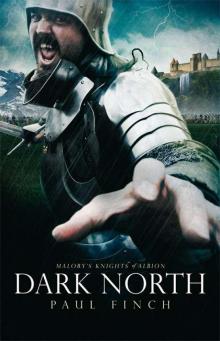 Dark North mkoa-3
Dark North mkoa-3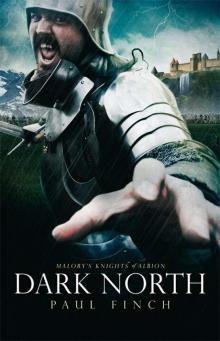 Dark North (Malory's Knights of Albion)
Dark North (Malory's Knights of Albion)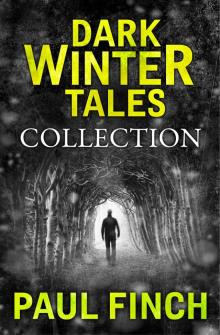 a collection of horror short stories
a collection of horror short stories Sacrifice
Sacrifice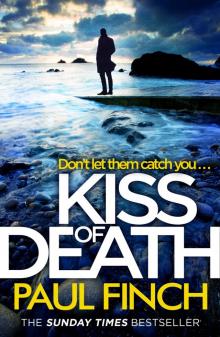 Kiss of Death
Kiss of Death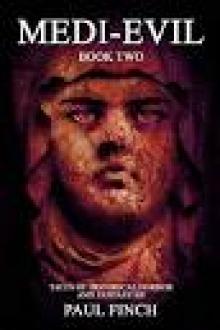 Medi-Evil 2
Medi-Evil 2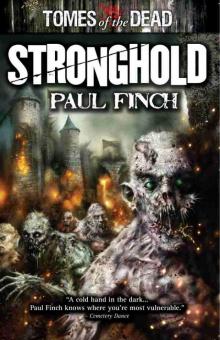 Stronghold
Stronghold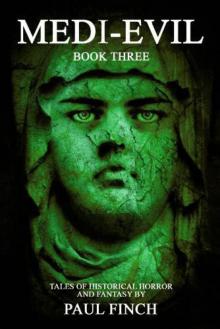 Medi-Evil 3
Medi-Evil 3 Dead Man Walking
Dead Man Walking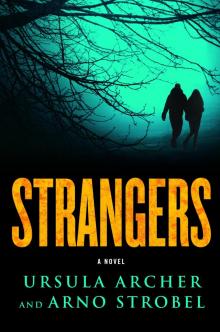 Strangers
Strangers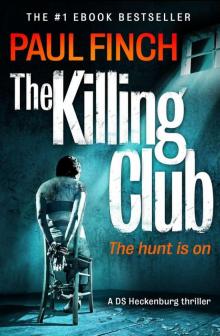 The Killing Club
The Killing Club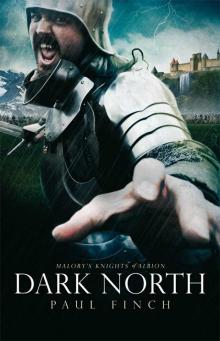 Dark North
Dark North A Wanted Man
A Wanted Man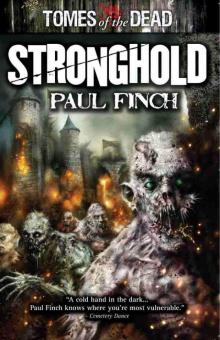 Stronghold (tomes of the dead)
Stronghold (tomes of the dead) Hunted
Hunted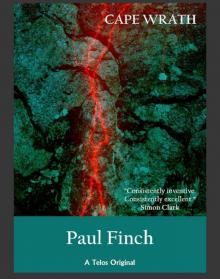 Cape Wrath
Cape Wrath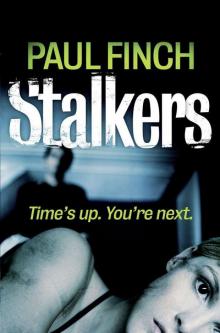 Stalkers
Stalkers The Burning Man
The Burning Man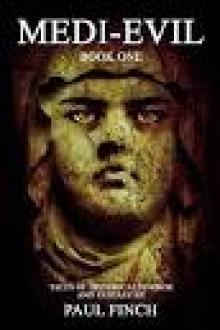 Medi-Evil 1
Medi-Evil 1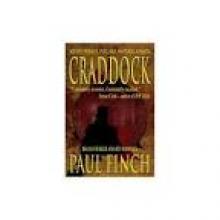 Craddock
Craddock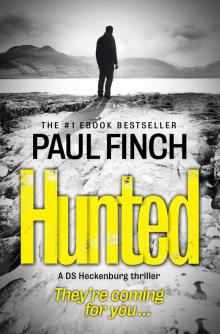 Hunted (Detective Mark Heckenburg Book 5)
Hunted (Detective Mark Heckenburg Book 5)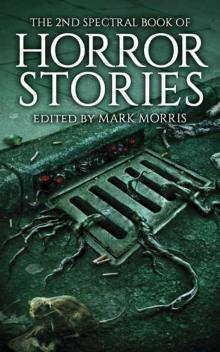 2nd Spectral Book of Horror Stories
2nd Spectral Book of Horror Stories The Chase
The Chase